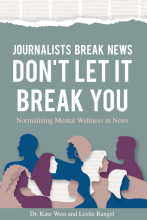Normalizing Mental Wellness in News w/ Kate West
Journalists today have a hard job. They sit in murder trials, visit crime scenes and have tough conversations with people who have just lost loved ones. They often have to look through images or videos that are very disturbing just to know what to write or broadcast on TV. These situations can trigger or create trauma that can develop into mental health struggles.
“You’re expected to be OK, get over it and get on to the next story,” said Kate West, an assistant professor of instruction in Moody College of Communication’s School of Journalism and Media.

In 2023, West published a book that discusses mental health in journalism titled “Journalists Break News: Don't Let it Break You. Normalizing Mental Wellness in News.” It offers solutions to professors and newsroom about what they can do to better prepare students and young journalists for the difficulties and pressure of the career.
West has been teaching broadcasting courses at UT since 2012 and noticed over time the number of students who dropped out of the broadcast industry three to five years in.
“I would ask them, ‘You were so passionate about this, you were so excited, you got a job right out of school, why are you leaving?’” West said. “And they would consistently site the mental health challenges with working as a journalist.”
This dilemma inspired West to reach out to her friend, Leslie Rangel, a journalist and mental wellness coach, to help her write a book that normalizes the conversation of mental health in journalism. Reporters who work in the field are expected to be tough and push through anything to do their job. Conversations that regard mental health, PTSD and job overwhelm don’t take place in many newsrooms.

West’s hope with this book is to prepare college or entry-level journalists to understand that their feelings are normal and that there are ways to help their mental health if they struggle.
The book isn’t just for journalists, West said, but for a wide range of careers in journalism such as producers.
“In the book we hear from a former CNN producer who had to watch a beheading and decide which parts they were going to show on CNN and when they were going to cut off the video,” West said. “She never left the building, but she really struggled after having to view those images.”
West said one of the things that most surprised her while writing the book was how many people, like her students, were excited that she was addressing these issues. They said how much they needed it, West said.
The journalists West interviewed told her they were glad to be able to have the space to share their stories. They felt confident to say that, at times, they weren’t OK and that the fear of missing the opportunity to write the next, big story was normal.

